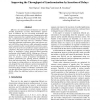Free Online Productivity Tools
i2Speak
i2Symbol
i2OCR
iTex2Img
iWeb2Print
iWeb2Shot
i2Type
iPdf2Split
iPdf2Merge
i2Bopomofo
i2Arabic
i2Style
i2Image
i2PDF
iLatex2Rtf
Sci2ools
140
Voted
HPCA
2000
IEEE
2000
IEEE
Improving the Throughput of Synchronization by Insertion of Delays
Efficiency of synchronization mechanisms can limit the parallel performance of many shared-memory applications. In addition, the ever increasing performance gap between processor and interprocessor communication may further compromise the scalability of these primitives. Ideally, synchronization primitives should provide high performance under both high and low contention without requiring substantial programmer effort and software support. QOLB has been shown to offer substantial speedups and to outperform other synchronization primitives consistently [17], but at the cost of software support and protocol complexity. This paper proposes the use of speculation and delays to implement a purely hardware-based queueing mechanism called Implicit QOLB. Making use of the pervasiveness of the Load-Linked/Store-Conditional primitives, we present a series of hardware mechanisms to optimize performance for sharing patterns exhibited by locks and associated data. The mechanisms do not require a...
Distributed And Parallel Computing | HPCA 2000 | Protocol Complexity | Software Support | Synchronization Primitives |
Related Content
| Added | 31 Jul 2010 |
| Updated | 31 Jul 2010 |
| Type | Conference |
| Year | 2000 |
| Where | HPCA |
| Authors | Ravi Rajwar, Alain Kägi, James R. Goodman |
Comments (0)

